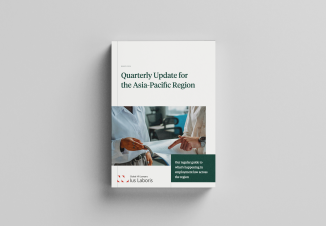
On 19 July 2021 the South Korean government announced the 2022 minimum wage as KRW 9,160 (approximately USD 7.92) per hour. This is a KRW440 increase (roughly 5%) from the 2021 minimum wage of KRW 8,720 per hour.
The announced 2022 hourly minimum wage corresponds to a monthly minimum wage of KRW 1,914,440 assuming a standard 40-hour work week with eight hours of paid weekly time off (totalling 209 hours a month).
The Labor Standards Act already requires an employer to promptly investigate reports of (non-sexual) workplace harassment; take appropriate measures (if any) to protect the alleged victim (such as relocation); and take appropriate action against the offender if harassment occurred. However, there are currently no specific penalties for failure to do so.
Effective 14 October 2021, employers’ obligations will be expanded and new penalties introduced.
Employers should evaluate whether they have the right policies and processes in place to both prevent workplace harassment, and objectively and promptly investigate any instances that occur and take appropriate action.
Note: The Labor Standards Act defines an ‘employer’ as ‘a business owner, or a person responsible for the management of a business or a person who acts on behalf of a business owner with respect to matters relating to employees.’ This can essentially encompass a legal entity or sole proprietor that legally employs people, as well as certain senior executives. However, an ‘employer’ who commits workplace harassment as described above will be an individual who actually commits the harassment.
The Equal Employment Opportunity and Work-Family Balance Assistance Act already provides penalties for acts of gender discrimination in employment, and workplace sexual harassment violations. Employees can file discrimination or sexual harassment complaints with the labour office, which can investigate, issue corrective orders, and impose administrative fines or refer matters for criminal prosecution in certain circumstances (e.g. for retaliation).
However, effective 19 May 2022, for the first time, employees will be able to petition the Labor Relations Commission for relief in gender discrimination and sexual harassment cases, and the available remedies will include damages. Until now, compensation for an employee victim has only been available via civil legal actions.
If the Labor Relations Commission finds that gender discrimination in employment occurred, it may issue a corrective order, and require the employer to pay compensation of up to three times the actual damages suffered by the employee. Any such corrective order may also be applied to other employees who have been discriminated against. The Labor Relations Commission will also be empowered to issue corrective orders and award up to treble damages where an employer has failed to take required measures with respect to a sexual harassment victim or harasser, or in the case of any retaliation.
Up to a year of unpaid (government subsidised) childcare leave under the Equal Employment Opportunity and Work-Family Balance Assistance Act is currently available to parents with a child who is aged eight or under, or in the second grade of elementary school or below. Effective 19 November 2021, pregnant female employees who are at medical risk of miscarriage or stillbirth will be allowed to use some of that year of childcare leave while still pregnant. The total childcare leave period per eligible child, including any childcare leave used during pregnancy, will still be one year.
The use of childcare leave during pregnancy is in addition to statutory maternity leave to which pregnant employees are already entitled. After taking childcare leave during pregnancy, the remaining childcare leave can be used after childbirth as normal, and can still be divided and used in two different periods after childbirth.
Effective 19 November 2021, the Labor Standards Act will provide pregnant female employees with a right to change their start and end times, while keeping the prescribed number of working hours. Pregnant employees in their 12th week or below or 36th week and above are already entitled to work reduced hours. This will provide an additional right to pregnant employees at any point in their pregnancy, to alter their start and stop times to better suit their needs. The employer may only refuse the request for certain reasons prescribed by regulation, such as where the changed hours would seriously interfere with the normal operation of the business.


